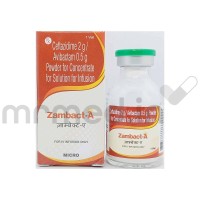Nefita injection contains an active component called folic acid, methylcobalamin, nicotinamide, vitamin C. It is used to treat or prevent vitamin deficiency, especially in patients with kidney disease or those on dialysis treatment. It also treats or prevents nerve damage caused by diabetes or other medical conditions. It treats or prevents conditions like vitamin B12 deficiency, vitamin B9 (folic acid) deficiency, and vitamin C deficiency. This medication also manages alcoholic neuropathy, liver disease, pre-and postoperative nutritional support, and general debility and weakness.
If you are hypersensitive to Nefita injection or any of the components of this medication, you should not use it. It should not be used in patients with optic atrophy caused by Leber's hereditary optic neuropathy. It should be used cautiously in patients with liver, kidney, and cardiovascular diseases. It may interfere with the absorption of certain medications, such as antibiotics and anticonvulsants. Tell your doctor about all your medications before receiving Nefita injection. It is generally safe for children and old people, but it should only be used under the supervision of a doctor.
Therapeutic Effects of Nefita Injection
Pregnancy
The safety of nefita injection in pregnancy has not been established. So, you must consult your doctor before taking this medication if you are pregnant.
Breast Feeding
It is important to consult your doctor before taking nefita injection if breastfeeding, as its safety in breastfeeding mothers has not been established.
Lungs
Consult with your healthcare provider before taking a nefita injection if you have any lung diseases.
Liver
Individuals with liver conditions should consult with their healthcare provider before taking nefita injection.
Alcohol
Alcohol can interact with nefita injection and cause side effects such as nausea, vomiting, and diarrhea. It is not safe to take alcohol while taking this medication.
Driving
Nefita injection is not known to impair the ability to drive or operate machinery. However, individual responses to medications can vary, so individuals should consult a healthcare provider before taking this medication while driving.
Serious
- Allergic reaction
- Chest pain
- Fast or irregular heartbeat
- Shortness of breath
- Seizures
- Fainting
Common
- Pain, redness, or swelling at the injection site
- Nausea
- Vomiting
- Diarrhea
- Flushing
- Headache
- Dizziness
The amount of time it takes for nefita injection to work varies depending on the condition being treated. For example, patients with vitamin B12 deficiency may experience improvement in their symptoms within a few days of receiving this medication. Patients with nerve damage may take several weeks or months to experience improvement in their symptoms.
The frequency of nefita injections will depend on the individual patient's needs and the condition being treated. For example, patients with vitamin B12 deficiency may need to receive this medication once a week or once a month. Patients with nerve damage may need this medication daily or weekly for several weeks or months.
If you miss a dose of Nefita injection, take it as soon as you remember. However, if it is almost time for your next dose, skip the missed dose and continue with your regular dosing schedule. Do not take a double dose to make up for the missed dose.
If you experience any side effects from Nefita injection, contact your doctor right away. Some side effects, such as an allergic reaction, may require immediate medical attention.
A nefita injection overdose can be fatal, especially in severe cases. It is important to seek medical attention immediately if you have overdosed on nefita injection.
Molecule name: Multivitamin with Antioxidants, Lycopene, Methylcobalamine, Zinc | Therapeutic class: Vitamin supplements |
Pharmacological class: Multivitamins | Indications: 1. Vitamin B12 deficiency 2. Vitamin B9 deficiency 3. Vitamin C deficiency 4. Pernicious anemia 5. Megaloblastic anemia 6. Pre- and post-operative nutritional support 7. General debility and weakness |



